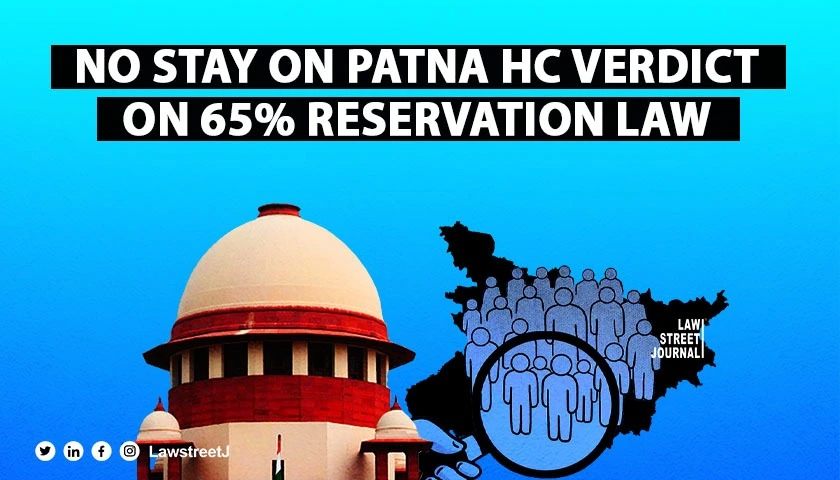NEW DELHI: The Supreme Court on Monday refused for now to stay the Patna High Court's June 20 judgment which set aside the increase in reservation for Backward Classes, Scheduled Castes and Scheduled Tribes (SC/STs) from 50 to 65 % in admission to educational institutions and public jobs.
A bench of Chief Justice of India D Y Chandrachud and Justices J B Pardiwala and Manoj Misra also declined to issue notice on the application for stay of the judgment.
The court, however, decided to examine the plea filed by the Nitish Kumar government against the HC's verdict.
"We are not inclined to stay at this stage...we will list the matter for final hearing in September," the bench said.
Senior advocate Shyam Divan for the Bihar government urged the apex court to stay the judgment, contending a lot of interviews were going on as per the new statute.
The court said it would grant leave and list the matter for final hearing.
The HC's two-judge bench of Chief Justice K Vinod Chandran and Justice Harish Kumar had declared the 2023 state law as ultra vires of the Constitution and violative of equality clause under Articles 14, 15 and 16 of the Constitution.
The High Court also said the State proceeded on the mere proportion of population of different categories as against their numerical representation in government services and educational institutions.
"The State should introspect on the reservation percentage within the 50 per cent limit, and exclude the 'creamy layer' from the benefits," the HC had said.
In its plea before the top court, the Bihar government questioned the validity of the High Court's view that the quota hike had violated the right to equal opportunity for citizens in matters of employment and education.
Their plea contender the HC erroneously set aside the Bihar Reservation of Vacancies in Posts and Services (for Scheduled Caste, Scheduled Tribes and Other Backward Classes) Amendment Act, 2023, passed following a caste survey carried out by the state government.
"The State of Bihar is the only state which carried out the exercise and published its caste survey report on socio-economic and educational conditions of entire population. The state has complied with the binding decisions of this Court and then amended the Reservation Acts," it said.
The High Court, however, failed to appreciate the true nature and import of Article 16(4) of the Constitution as per the law laid down by the Supreme Court in many cases, including Indra Sawhney (Mandal Commission), Jaishri Laxmanrao Patil (Maratha quota) and many other cases, the plea said.
It also claimed the HC has transcended beyond the legitimate scope of judicial review by substituting “opinion of State” as to the adequacy of representation with its own opinion.
"The judgment further failed to appreciate that it is trite law that the 50% ceiling is not an inviolable rule and may be breached in exceptional circumstances. Based on the caste census, the government has rightly concluded that the backward classes were not adequately represented and there was a need to enhance affirmative action to achieve the constitutional goal of substantive equality," it said.















